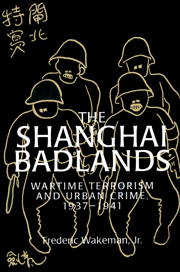Book contents
- Frontmatter
- Contents
- Dedication
- Acknowledgments
- Glossary
- Shanghai, 1940
- Metropolitan Shanghai
- Dedication
- Prologue: Consequences
- 1 Island Shanghai
- 2 Blue Shirts
- 3 National salvation
- 4 Retaliation: Pro-Japanese terrorism
- 5 Provocation: The Chen Lu assassination
- 6 Capitulation: The Xi Shitai assassination
- 7 The puppet police and 76 Jessfield Road
- 8 Terrorism and crime
- 9 Rackets
- 10 Terrorist wars
- 11 Dimout
- Epilogue: Outcomes
- Abbreviations
- Notes
- Bibliography
- Index
10 - Terrorist wars
Published online by Cambridge University Press: 02 November 2009
- Frontmatter
- Contents
- Dedication
- Acknowledgments
- Glossary
- Shanghai, 1940
- Metropolitan Shanghai
- Dedication
- Prologue: Consequences
- 1 Island Shanghai
- 2 Blue Shirts
- 3 National salvation
- 4 Retaliation: Pro-Japanese terrorism
- 5 Provocation: The Chen Lu assassination
- 6 Capitulation: The Xi Shitai assassination
- 7 The puppet police and 76 Jessfield Road
- 8 Terrorism and crime
- 9 Rackets
- 10 Terrorist wars
- 11 Dimout
- Epilogue: Outcomes
- Abbreviations
- Notes
- Bibliography
- Index
Summary
Just as soon as the Japanese forces defeated the Chinese defenders of Shanghai in November 1937, the Imperial Army took over the Guomindang censor's office in the International Settlement and announced that all Chinese newspapers would have to be submitted for examination. In order to avoid such a demeaning and disgraceful submission to Japanese censorship, many Chinese newspapers hired British or U.S. citizens as publishers in order to register with the Settlement authorities as a foreign publication. Shen bao, for instance, became a U.S.-registered concern, ostensibly being published by N. F. Allman, the U.S. lawyer who was also a member of the Shanghai Municipal Council. In this way, “foreign-published newspapers” and their literary supplements became the most important forum for intellectual resistance during the period of “island Shanghai.”
Newspaper wars
Since the Japanese and puppet authorities could not manipulate these “foreign-published newspapers” through censorship, they resorted to terrorism. Beginning in early February 1938 staff members and editors of foreign-registered papers, such as L. Z. Yuan at the Evening Post or Director Samuel Chang at the Damei wanbao (the Chinese edition of the Evening Post and Mercury), received threatening letters—or in some cases packages with decayed human hands inside—that in one way or another warned them to cease anti-Japanese activities or face the consequences.
Those who refused to shut up were likely to be bombed or shot, as was Samuel Chang on July 16,1940, as he sat having coffee and a sandwich in a German restaurant on Nanjing Road:
Wang Ching-wei's [Wang Jingwei's] Japanese-paid gunmen dashed about casually shooting up Chinese who refused or hesitated to cooperate with the New Order in East Asia. […]
- Type
- Chapter
- Information
- The Shanghai BadlandsWartime Terrorism and Urban Crime, 1937–1941, pp. 115 - 127Publisher: Cambridge University PressPrint publication year: 1996

